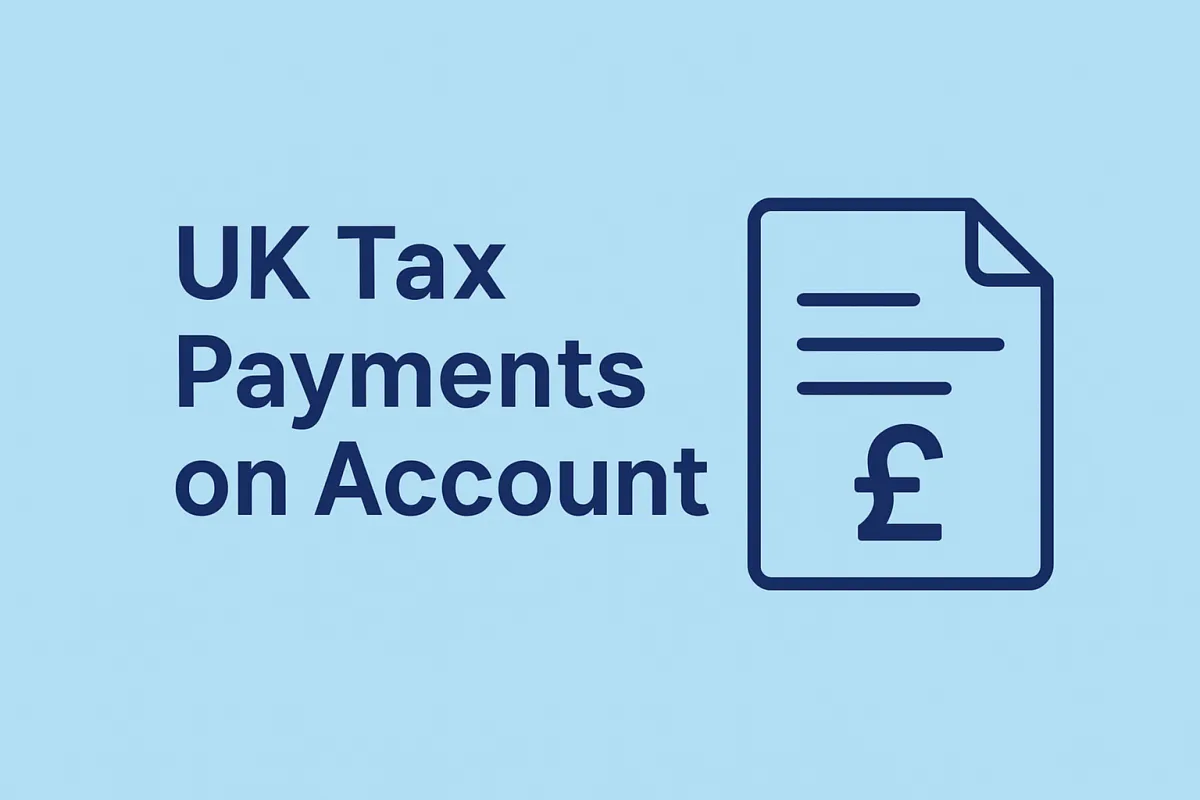
What Are UK Tax Payments on Account?
If you’re self-employed or receive income that isn’t taxed at source (like rental income or dividends), you may have heard of Payments on Account. They’re one of those HMRC quirks that can catch people off guard – especially in your second year of trading.
Let’s break it down simply…
💡 What Are They?
Payments on Account are advance payments towards your next year’s tax bill.
Here’s the idea:
• You just filed a tax return showing your profit for the year.
• HMRC uses that tax bill as a guess for what you’ll owe next year.
• Instead of waiting until next year to pay again, they ask you to pay half of it in advance – twice.
These payments are due:
• 31st January (same day as your main tax bill)
• 31st July
Each payment is usually 50% of your previous tax bill, not including student loans or capital gains.
🧮 A Worked Example
Let’s say:
• You made £30,000 profit from self-employment.
• Your tax bill for that year is £4,000.
Here’s how it would look:
First Year (say 2023/24):
• 31 Jan 2025: You pay the £4,000 tax bill for 2023/24.
But… because HMRC thinks you’ll earn a similar amount in 2024/25, they also want you to start paying next year’s tax bill in advance:
• Payment on account 1: £2,000 (50% of £4,000) – due 31 Jan 2025
• Payment on account 2: £2,000 – due 31 July 2025
So on 31 Jan 2025, you’ll pay:
✅ £4,000 (last year’s tax)
✅ £2,000 (first payment on account)
➡️ Total due: £6,000
Then another £2,000 in July.
🧾 What If I Earn Less Next Year?
If you think your income will be lower next year, you can ask HMRC to reduce your payments on account.
But a word of caution:
If you reduce them too much and end up owing more, HMRC will charge interest on the shortfall. So don’t guess too low.
📅 What Happens the Year After?
Let’s say your actual tax bill for 2024/25 turns out to be £4,200.
• You’ve already paid £4,000 on account.
• You only owe the £200 balance, due by 31 Jan 2026.
• At the same time, you start a new round of payments on account based on that £4,200.
So it’s a rolling system, always looking one year ahead.
🔌 A Better Analogy: Like Your Gas or Electric Bill
Think about how your energy provider works:
• You start with estimated monthly payments based on your past usage.
• You pay these on account – basically in advance.
• Then, at the end of the year, you submit your meter readings.
• The supplier works out your actual usage and either bills you for the difference or gives you a refund.
HMRC does exactly the same thing with Payments on Account.
• They look at last year’s tax bill.
• They estimate that this year will be similar.
• You pay two chunks in advance (Jan and July).
• Then, when you file your next return, they adjust the total:
• If you’ve overpaid, they owe you.
• If you’ve underpaid, you top it up.
👉 Just like your energy bill – it’s all about estimating, paying ahead, and squaring up later.
✅ Key Takeaways
• Payments on account are advance tax payments based on last year’s bill.
• They’re paid in two instalments: 31 Jan and 31 July.
• You only make them if your last tax bill was over £1,000 (and less than 80% was deducted at source).
• You can apply to reduce them if income is falling – but be cautious.
• They can come as a shock in your second year, so plan ahead!
Need Help?
If you’re unsure whether your payments on account are right, or you’re worried about cash flow, get in touch. It’s far easier to plan than to panic when the deadline hits!
